Driver and Vehicle Standards Agency business plan, 2021 to 2022
Published 8 June 2021
Non-executive Chair and Chief Executives’ Foreword
The Department for Transport (DfT) announced the appointment of Loveday Ryder, as chief executive from 1 January 2021.
Loveday’s wide range of business change and performance improvement experience will be invaluable in helping DVSA overcome the operational challenges created by the impact of the coronavirus pandemic and on behalf of the board, I would like to welcome Loveday and express my thanks to Gareth Llewellyn for his immense contribution as chief executive.
Responding to the coronavirus (COVID-19) pandemic
The pandemic, and in particular the responses needed, had a significant impact on the delivery of our services and plans, however we are proud of the actions we have taken during this unprecedented period.
We:
- provided driving tests for NHS and critical workers to keep Britain running
- provided vehicle approvals for emergency services to put ambulances on the road in rapid time to help those who needed care
- carried on our enforcement work throughout removing dangerous drivers and vehicles from our roads
- created a virtual customer service centre
- responded to the need to make changes to testing as a result of the pandemic, including changes to hundreds of thousands of theory and driving testing appointments
- continued to produce outstanding work whilst adjusting to working at home during a national crisis
- met our Brexit transition commitments
A focus on recovery
Our focus for this year’s business plan will be on the recovery of our services, on the reduction of our backlog and on ensuring a sustainable position for our finances.
We will safely manage the return of our driver and rider services in line with our recovery plan, reducing car practical test waiting times to single figures as soon as possible after COVID-19 restrictions on practical testing have been lifted.
We will be working with Traffic Commissioners on their service recovery and preparing for the extension of vehicle operator licensing to include some light goods vehicles, implementing in May 2022.
Despite the challenges faced to recover our services following the COVID-19 pandemic, we continue to prepare for an ambitious future by:
- working with industry on the development of an action plan to implement the recommendations of the heavy vehicle testing review
- learning about the benefits and challenges of new ways of working during the pandemic, and what this could mean for our future plans around flexible working locations, that balance the needs of customers, teams and individuals
- creating office spaces that encourage collaboration and creativity, once we’re able to move beyond our current COVID-secure environments
- exploring further opportunities to modernise the delivery of the driving test in response to feedback from our customers, including insight received as we recover the backlog of tests
- supporting the adoption and implementation of the new Mobility Package to improve drivers’ working conditions and safety
Shrin Honap
DVSA Non-Executive Chair
Loveday Ryder
DVSA Chief Executive
Who we are and what we do
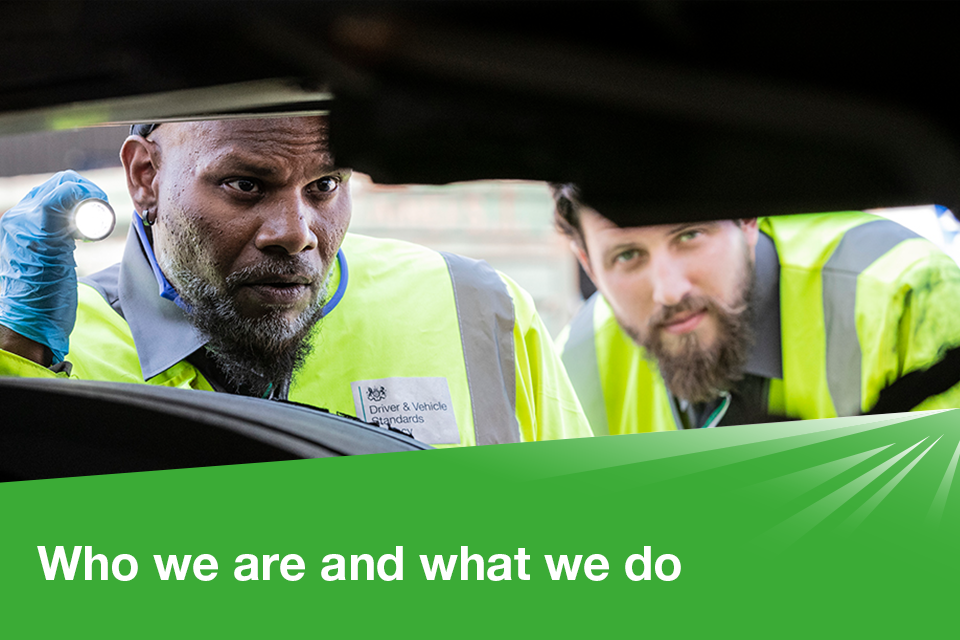
Our purpose at the Driver and Vehicle Standards Agency is to help you stay safe on Britain’s roads. Our aim is to improve road safety, user experience and value for money.
We help you stay safe on Great Britain’s roads by:
- helping you through a lifetime of safe driving
- helping you keep your vehicle safe to drive
- protecting you from unsafe drivers and vehicles
What we do
We carry out driving tests, approve people to be driving instructors and MOT testers, carry out tests to make sure lorries and buses are safe to drive, carry out roadside checks on drivers and vehicles, and monitor vehicle recalls. Our work affects millions of people and thousands of businesses. Most importantly, our work saves lives.
We’re an innovative organisation that values professional expertise. We invest in our people and champion inclusive and diverse teams. And we make sure colleagues have the skills to meet the needs of Great Britain’s road users.
How the agency is changing
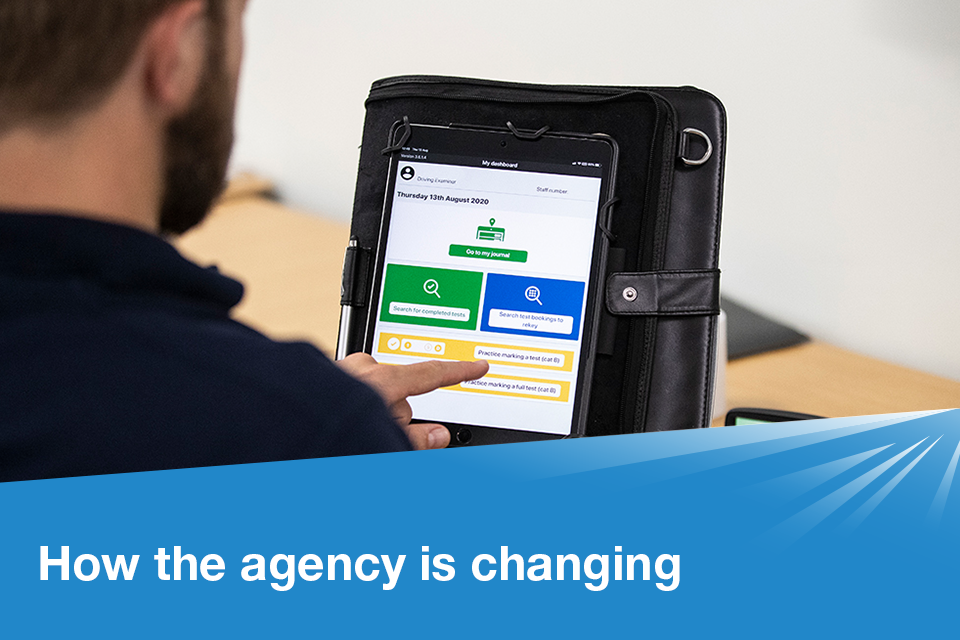
We need to keep in step with customer expectations, technological innovations, and new ways of working. Before the COVID-19 pandemic, we were already facing a period of rapid change. As we emerge from the pandemic, we’ll continue to improve the experience for our customers and help the country build back better - being fairer, safer, stronger and greener than before.
Helping you through a lifetime of safe driving
Improving the theory test service
Since the theory test started in 1996, it’s been run for us by a single supplier. This year, we’ll make the biggest change to the way the theory test has been run in its history.
The new model will provide benefits for our customers and colleagues. We will:
- create a new network of test centres across the UK, making sure that every centre is accessible to disabled people
- make sure 100% of the population either live within 40 minutes of a test centre (considering local travel conditions and public transport), or are within 40 miles of a test centre in parts of the country with a lower population density
- provide a simpler and easier to use online booking service, that’s better designed to meet the needs of its users
- bring customer service and support for the theory test in-house through our existing customer service centres
The new booking service will launch in July 2021, and the first tests under the new model will take place in September 2021.
Improving our driver and rider services
The IT system that supports driving test bookings and instructor registration is old and not as flexible as it needs to be. We call it the ‘testing and registration system (TARS)’.
We’ll run a discovery phase to help us understand what users need, what constraints we face, and what opportunities there are to improve things. Researching and identifying these things will help us develop a clear plan to either transform or replace existing services.
This will help us to achieve our goal of providing great services for all our users - whether they’re learner drivers, driving instructors, training schools or our own colleagues.
Making motorcycling safer
When Parliamentary time allows, we’ll introduce a package of measures to improve the way motorcycle training works, so that newly-qualified riders are better prepared for riding on modern roads.
We’ll do this because 21% of all fatalities on Great Britain’s roads are motorcyclists, despite representing only 1% of vehicle traffic.
We believe that the risks motorcyclists face on the road could be reduced by more realistic and individually tailored training, delivered by better qualified instructors.

Helping you keep your vehicle safe to drive
Providing more benefits through our commercial vehicle services project
Our commercial vehicle services project has already seen us move to recording MOT results for HGVs, buses and trailers on mobile devices. This year we’ll move to the next phase of the project, making it easier for our customers to pay online and see their test transactions. This will also help us to use our data more effectively.
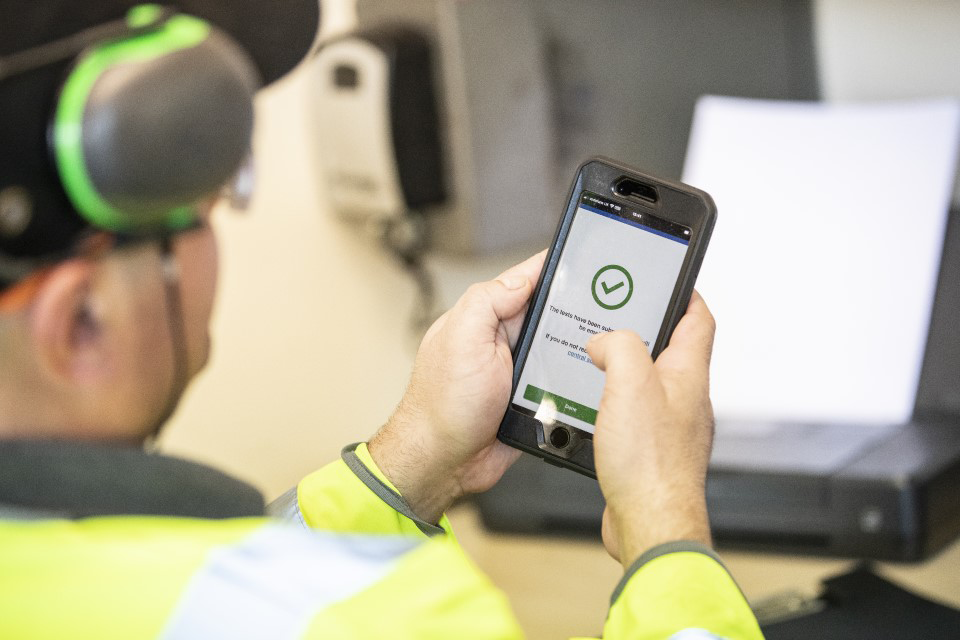
Carrying out the recommendations from the heavy vehicle testing review
DfT carried out a review of our heavy vehicle testing services from September to December 2020, and published its findings in March 2021. The review identified 6 areas for future work, including how we schedule testers and how easy it is for vehicle operators to book MOTs.
We will work with vehicle operators and authorised testing facilities (ATFs) to prioritise where we improve and develop and implement an action plan.
Reviewing and improving how the Individual Vehicle Approval (IVA) scheme works
You can use the Individual Vehicle Approval (IVA) scheme if you make or import a single vehicle or a very small number of vehicles. It involves an inspection and other tests to make sure the vehicle meets UK safety and environmental standards.
It’s also possible to get approval for a type of vehicle, rather than each individual vehicle. This is called ‘type approval’ and it’s managed by the Vehicle Certification Agency (VCA).
This year we’ll work with:
- VCA and DfT to review how the service is provided
- our customers to make sure it meets their needs
We’ll keep making improvements into the future.
Protecting you from unsafe drivers and vehicles
We’re starting a programme of work to:
- improve our understanding of commercial road users
- introduce new interventions and ways of working to enable them to meet driver and vehicle standards
We’ll use new technologies and joined-up data and intelligence to increase our capacity to identify serially and seriously non-compliant drivers and vehicle operators. And we’ll put proportionate and targeted responses in place to prevent them from being a danger on Great Britain’s roads.
We’ll focus on having the right skills and tools deployed at the right time and place. These include:
- an increased focus on remote enforcement
- expansion of partnership working across the industry
- developing a new, robust casework management system to cope with increased demands
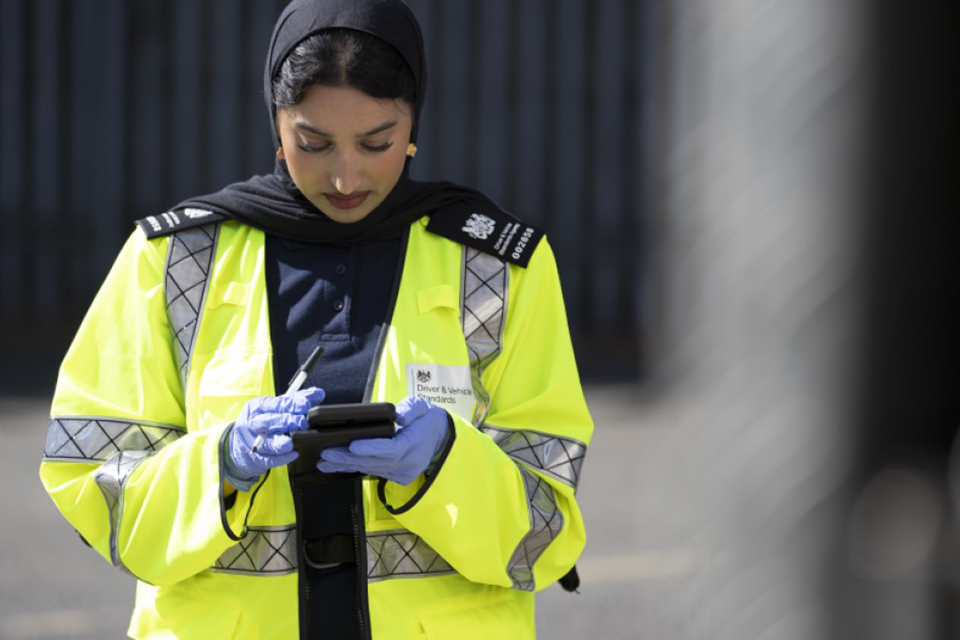
Preparing for changes to van operator licensing rules for international journeys
From May 2022, the rules for light goods vehicles (vans) with a gross vehicle weight over 2.5 tonnes but under 3.5 tonnes making journeys in the EU will change. To transport goods to or through the EU, Liechtenstein, Norway and Switzerland, these vehicles will need to:
- be listed on a goods vehicle operator licence
- have a UK Licence for the Community (an international road haulage licence)
This year we will prepare for this, working with traffic commissioners to make sure we have systems and processes in place to allow applications for licences to be dealt with in plenty of time. We will also make sure we have appropriate enforcement options available to us.
Digital, data and new technology
When we create or provide services, we use the Government Service Standard. This helps us focus on user needs, solve the real problem users have, make our services simple, and it helps us to improve our services frequently.
We’ll work with DfT as part of the ‘compliant vehicle’ initiative, reviewing our data sharing arrangements with the police and partners.
We’ll work with the Driver and Vehicle Licensing Agency (DVLA) to provide a strategic data enquiries solution to support the transformation of our services and to maintain the safe and secure handling of customer data.
Connected and autonomous vehicles
We’ll work with DfT, the Centre for Connected and Autonomous Vehicles (CCAV), the Law Commission and industry to help make sure that vehicle approval, driver training and testing, and vehicle safety assurance services develop to enable connected and autonomous vehicles to be used safely on our roads.
The Highway Code
We’ll prepare draft amendments to The Highway Code to put before Parliament so that both Houses can approve changes needed to:
- improve the guidance about safety on smart motorways
- introduce automated lane keeping systems (ALKS) by manufacturers
- better safeguard vulnerable road users and encourage active transport
Plans for 2021 to 2022
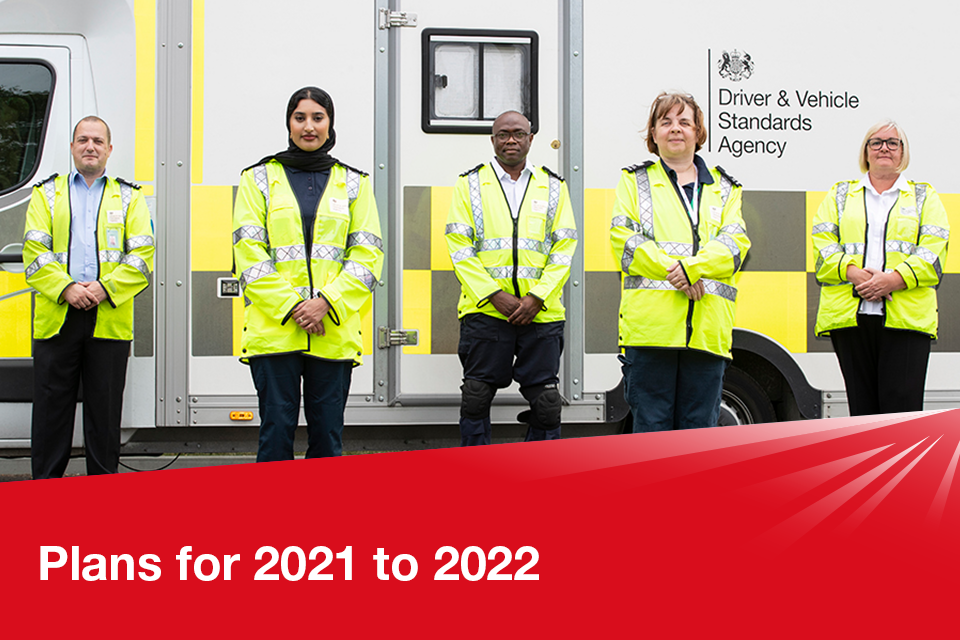
Our performance targets for the year are set out here. Our focus for this year’s business plan will be on the recovery of our services, on the reduction of our backlog and on ensuring a sustainable position for our finances.
We’re committed to the safe recovery of all our services as quickly as possible. We will look at all appropriate measures which enable us to fully recover backlogs and reduce waiting times.
Our performance is based on the expectation that the government’s roadmap continues as planned and there is no return to COVID-19 restrictions during 2021 to 2022.
Any further restrictions on a local or national level will impact on our ability to deliver our targets.
Deliver our theory and driving test recovery plan
These are the first steps towards recovery of our theory and driving test services.
| Measure | Target for 2021 to 2022 |
|---|---|
| Restart theory tests and driving tests | April 2021 |
| Revert to 7 car driving tests per day (per full time driving examiner schedule) | Once COVID-19 restrictions are lifted |
Improving our theory test service
There’s more information about the changes to our theory test service in the section about how the agency is changing.
| Measure | Target for 2021 to 2022 |
|---|---|
| Launch our new theory test booking service | July 2021 |
| New theory test service transitions to public service delivery at UK test centres | September 2021 |
Customer service and satisfaction
We’ll match or improve on our 2020 to 2021 customer satisfaction baselines as follows.
| Measure | Target for 2021 to 2022 |
|---|---|
| Car practical test candidates satisfied with the service they receive from DVSA | 70% |
| Authorised testing facilities satisfied with the service they receive from DVSA | 80% |
| Operators satisfied with the service they receive from DVSA | 80% |
| MOT centres satisfied with the service they receive from DVSA | 80% |
| Call handling times | 70% of calls handled within 30 seconds |
| We will retain the Customer Service Excellence standard |
Enforcement
| Measure | Target for 2021 to 2022 |
|---|---|
| Detecting serious roadworthiness defects and traffic offences | 28,000 |
| Increase by at least 5% from 2020 to 2021 target of the number of MOT cases where we act upon the most serious fraud, dishonesty and negligence | 5% |
Environmental sustainability
| Measure | Target for 2021 to 2022 |
|---|---|
| DVSA will contribute towards the government’s aim of net-zero greenhouse emissions by 2050 through achieving the first year of the 2021 to 2025 Greening Government Commitments | |
| By December 2022, 25% of the DVSA car fleet should meet relevant Government Fleet Commitment emission standards as set out by the Office of Zero Emission Vehicles | 25% (by December 2022) |
Our finances
| Measure | Target for 2021 to 2022 |
|---|---|
| Deliver against our efficiency plan | £2.7 million |
Our people
| Measure | Target for 2021 to 2022 |
|---|---|
| Continue to support our colleagues to ensure non-COVID-19 sickness absence remains below pre-pandemic levels (as at February 2020) | Below 9.33 days per FTE by March 2022 |
Supporting our plan
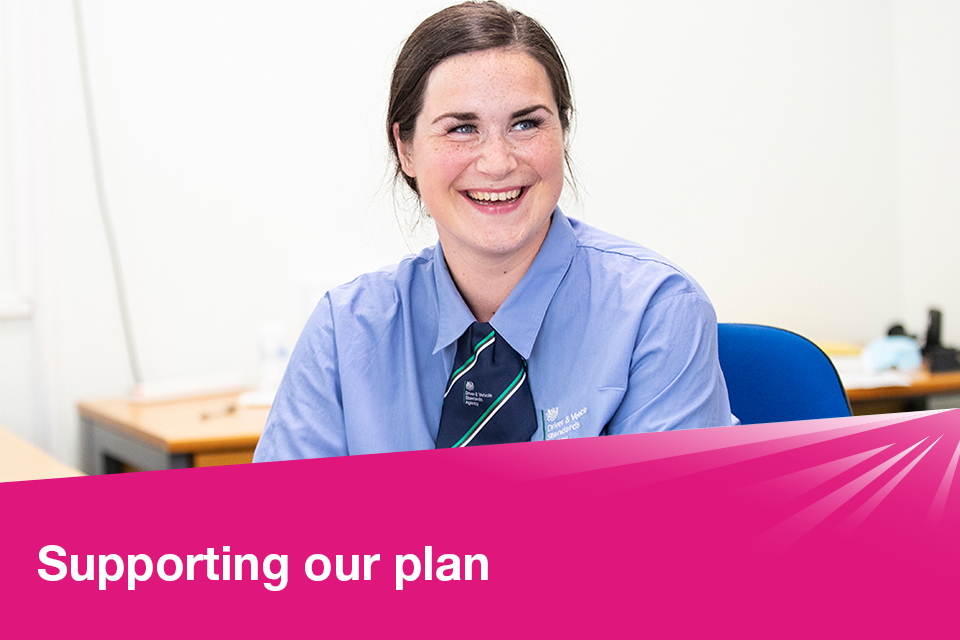
A great place to work
Our vision is to empower and support our people to help keep Britain’s roads safe.
Our people plans in 2021 to 2022 include:
- promoting a culture across DVSA focused on diversity, inclusion, safety, wellbeing, innovation and engagement
- building an environment where our people are future focused, skilled and ready to meet changing customer expectations and adopt new technology and ways of working
- attracting, identifying, developing, and retaining high-performing talent to help DVSA grow and succeed
- listening to our people and involving them in plans for transforming our services to get the best outcomes
Delivering on these plans will help DVSA build an environment where our people can be at their best.
Workwise
Workwise is a project that will help us to work together better, by focusing on outcomes for our customers, each other, and ourselves. In some organisations it’s called ‘smarter working’ – but it’s so much more than that to us. It’s about having the technology, places to work, flexibility, trust and courage to make the best possible decisions about how, when and where to work, to best serve our customers.
We’re learning from our experiences of different ways of working during the pandemic, and this is helping us shape how and where our colleagues work in the future. Workwise aims to ensure DVSA meets the Government Property Agency’s standards for modern ways of working by the end of 2022.
At the same time, the project will review our administrative estate and make sure we have workspaces suited to post-pandemic ways of working.
Shared services strategy
The DfT Future of Shared Services programme aims to improve our user experience across our HR, finance and commercial processes, and to provide a more responsive and flexible system for all our day-to-day transactions. We’re scheduled to be the first in the DfT group to migrate to the new system, with the final migration concluding in mid-2023.
Commercial delivery
When we buy products or services, we’ll split our spend into categories which contain similar things, such as vehicles, professional services or facilities management. Expert category managers will focus their time on market analysis and supplier management to help us identify areas for efficiency.
To make this a success, our commercial teams will:
- work closely with teams that need to buy products and services
- develop and improve the management of our strategic suppliers
In 2021 to 2022 our commercial objectives are to:
- achieve maximum value from every commercial relationship to support our 5-year strategy
- embed a category management approach to delivering commercial services
- deliver £2.5 million in commercial savings delivering our services more efficiently and improving our customer experience
Communications and engagement
Safer roads reduce strain on emergency services and the NHS. So our aim is clear, trusted communication that changes behaviours and makes people safer. We will build our relationships on mutual understanding and respect, and the views and needs of our customers and stakeholders will better inform our approach.
In 2021 to 2022, we’ll refresh our communication and engagement plan, so that we can build back better from COVID-19. We will:
- run campaigns to prompt or change behaviour that will help everyone stay safe on Britain’s roads
- continue to support all line managers to improve colleague engagement through a targeted plan of activities
- implement our educate and advise plan, providing clear, useful and trusted guidance which helps people through a lifetime of safe driving
- rebuild our relationships with approved driving instructors (ADIs) and other trainers through opportunities to talk to us, give feedback on our plans, and to help us develop and shape our services
- support and engage with our customers, responding to their enquiries and complaints in a timely, clear and concise manner
Our finances
From 1 April 2021, DVSA is consolidated into the DfT group accounts.
We aim to manage our finances effectively by:
- managing our income and expenditure within the agreed delegated budgets from DfT
- reviewing our fees to make sure they cover the cost of our services
- delivering investment and change projects to time, quality and cost
- delivering the committed efficiency savings identified in the DVSA efficiency plan
Cross government commitments
| DfT/DVSA target | Target for 2021 to 2022 |
|---|---|
| Payment of invoices within 5 working days | 80% |
| Freedom of Information Act - provide a response within 20 working days | 90% |
| Parliamentary questions - provide a response by the due date | 100% |
| Ministerial correspondence - provide a response within agreed timescales | 95% |
| Official correspondence - provide a response within 20 working days | 80% |
Annex A
| Financial forecast | Business plan 2021 to 2022 (£’000) |
|---|---|
| Statutory fee income | 354,275 |
| Non-statutory income | 12,278 |
| Total income | 366,553 |
| Staff costs | (204,739) |
| IT costs | (47,060) |
| Accommodation costs | (45,600) |
| Theory test charges | (33,688) |
| Depreciation | (35,577) |
| Other non-pay costs | (49,548) |
| Total expenditure | (416,212) |
| Net operating deficit | (49,659) |
| Net interest | (8,294) |
| Net deficit | (57,953) |
Departmental Expenditure Limit (DEL) as voted in Parliament
| Resource DEL[footnote 1] | 23,630 |
|---|---|
| Annually Managed Expenditure (AME) | (1,253) |
| Total Resource and AME | 22,377 |
| Capital DEL | 47,198 |
-
Non-ringfenced RDEL only ↩
